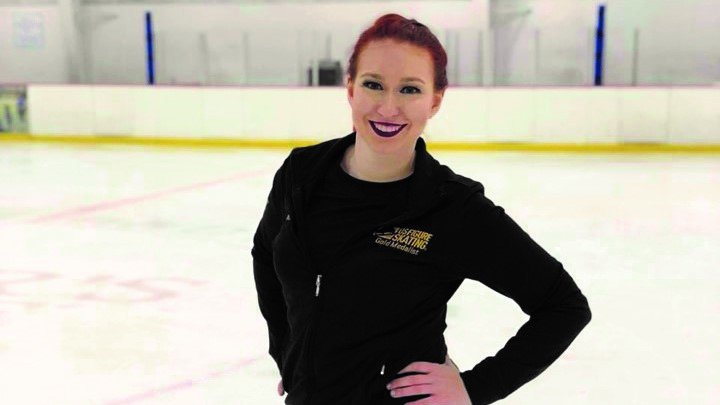National Get Up Day is Feb. 1. Through the month of February, U.S. Figure Skating will be featuring its eight Get Up ambassadors. The following story appeared in the January issue of SKATING magazine.
By Abby Farrell
Kristen McCutcheon fell in love with skating after her dad gave her skating lessons for her eighth birthday. She continued to skate growing up and eventually became the Learn to Skate USA coordinator for the Figure Skating Club of the Quad Cities at River’s Edge Ice Rink. This was the same rink, in Davenport, Iowa, where she got her start.
In March 2022, McCutcheon stepped on the ice to teach a Learn to Skate USA lesson; she had no idea what was to come.
“I was on the ice teaching and I sneezed. I felt incredible pain in my neck,” McCutcheon said. “I just thought it was a migraine, so after I got done teaching, I went home because I just wasn’t feeling good.”
Thinking nothing of it, she competed at the U.S. Adult Midwestern Sectional Championship just a few days later.
Three weeks later, she lost her ability to speak and was rushed to the hospital at the University of Iowa.
Doctors discovered that after sneezing, McCutcheon had unknowingly dissected both of her carotid arteries and her left vertebral artery, which caused her to have a stroke. They told McCutcheon she had suffered a bilateral ischemic stroke. This is a rare event that can occur from multiple strokes on both sides of the brain, or, in a unique instance, where a stroke in one hemisphere affects the other.
Since she has been a skater for most of her life and fallen many times, it was puzzling to her how something like a sneeze could cause this severe a reaction.
“Honestly, it’s still quite shocking,” she said. “It’s quite shocking to all the doctors as well.”
In the months that followed, McCutcheon went through intense physical and speech therapy twice a week.
Shari Baker is a fellow coach at the River’s Edge Ice Rink and the one who nominated McCutcheon as a Get Up ambassador. Their relationship spans several years as McCutcheon was a student of Baker’s in her teens. Now they coach together at the Figure Skating Club of the Quad Cities.
“It was pretty scary [to see Kristen go through this], though it was even scarier for her children and fiancé,” Baker said. “Her mom gave us updates on how she was doing, and everyone was very worried about her. I’m just glad that she is doing as well as she is.”
Despite making progress in therapy, three months after her first stroke, another setback put her back in the hospital.
“I was trying to come to work. I was teaching from the boards but really I wasn’t cleared to go back,” McCutcheon said. “In June, the week before our local competition, I got sick again, and I ended up having to spend the weekend in the ICU. They had given me TPA, a drug used to break up a blood clot and restore blood flow to the brain, and then the next weekend we did our competition.”
In therapy for several hours each week for months, McCutcheon’s main goal was to skate again.
“It was kind of scary to get back on the ice because I was hoping I would still remember how to skate,” she said. “Shocking, I guess, I remembered it all. I got on the ice briefly for our spring show.”
Since skating has been part of her life for as long as she can remember, McCutcheon couldn’t imagine a world where she wasn’t involved in some way.
“Even now there are days where I still don’t feel great, so I teach from the boards,” she said. “But skating itself has been a constant in my life since I was 8, so the thought of it not being a part of my life is just kind of unheard of.”
While McCutcheon has made great strides to get healthy and get back on the ice, there are still some lasting effects from the strokes.
“I noticed I get tired easier,” she said. “I still have to be mindful of that, which is a hard pill to swallow when you’re an active person.”
She also still experiences numbness in her left foot, difficulty turning her head and problems with her memory.
As a Get Up ambassador, McCutcheon hopes to inspire people with her story and encourage them to think about the positive side of every situation.
“Don’t always think about the negative because initially I was told I would never be able to be on the ice again,” she said.
Baker hopes others are inspired by McCutcheon’s story and that they take away a few life lessons.
“I hope that they see that there isn’t anything that could keep anyone down,” Baker said. “You can overcome any kind of obstacle if you set your mind to it and work toward the goals that you want to achieve. Keep on climbing and keep on getting up.”



